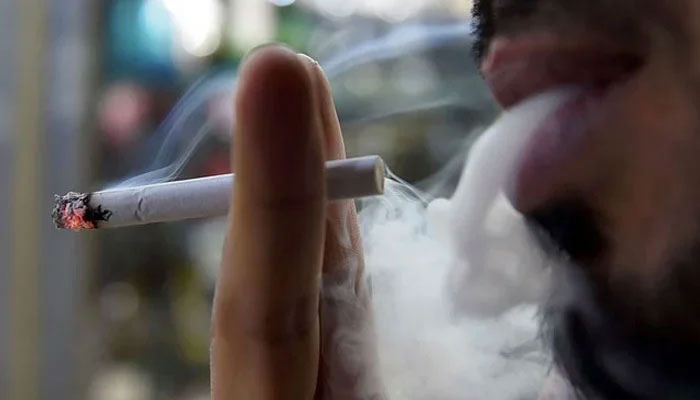Aurat Foundation advocates for tobacco tax hike amid GST concerns
ISLAMABAD: The Aurat Foundation advocates for a 26 percent FED increase on cigarettes instead of burdening the public by imposing GST on petroleum.
Speaking at an iftar dinner for the newly elected MNAs, Mr. Naeem Ahmed Mirza, Executive Director of the Aurat Foundation, called on the federal government to implement a tobacco tax hike in 2024 to reduce the budget deficit and save lives. Presently, Pakistan operates with a two-tiered Federal Excise Duty (FED) structure for cigarettes, categorised by price tiers. He further emphasised that reducing tobacco consumption through higher taxes could alleviate the economic burden associated with tobacco-related diseases, potentially freeing up resources for poverty reduction efforts such as targeted social programs and economic development initiatives.
Mr. Anees Ahmed, Country Adviser of the Campaign for Tobacco-Free Kids, briefed the MNAs, saying that after a substantial increase in 2022–23, the FED share in retail prices reached 48% and 68% for the low and high tiers, respectively. However, the levelling off of the FED share in 2023-24, due to the absence of rate adjustments, could adversely affect revenue and public health efforts.
The Aurat Foundation proposes a 26.6% FED increase in 2024 to recoup 19.8% of the costs, narrowing the gap between health burdens and tax revenues. This hike could potentially lead to 517,000 fewer smokers, a 12.1% increase in tax revenue, and a 19.8% recovery of health costs.
Beyond 2023-24, the government should integrate cost recovery into tobacco tax policies through automatic adjustments, implement a uniform FED rate across all cigarette brands, and prescribe tax increases for the next three years.
Ms. Mumtaz Mughal, Director Programmes at Aurat Foundation, highlighted that in Pakistan, 31.9 million adults aged 15 years and older, approximately 19.7% of the adult population, are current tobacco users. Tobacco use leads to over 337,500 deaths annually in Pakistan, amounting to 1.4% of the nation’s GDP each year, quoting a World Bank report.
Several women parliamentarians from all political parties participated.Ms. Zeb Jaffar, MNA, voiced her full support for increasing taxes on cigarettes and other tobacco products and offered all-out support for the rights of children in and out of parliament.
Ms. Sahar Kamran, MNA, expressed her dedication to the rights of children and pledged to continue her mission of enacting child rights legislation in parliament.Syeda Shehla Raza, MNA, former provincial minister of women in Sindh, supported the anti-tobacco campaign.
MNAs Ms. Naima Kanwal, Ms. Shazia Sobia, Ms. Naeema Kishwar Khan, Minority MNA from Thar Ms. Neelam Sahiba, Ms. Mehreen Razzaq Bhutto, and Ms. Mahjabeen Abbasi also spoke and expressed their support for the anti-tobacco campaign and child-friendly legislation in the parliament.
Syed Safdar Raza, an anti-tobacco campaigner at the Aurat Foundation, highlighted that the suggested tax hike promises a clear ‘win-win’ situation for both health and revenue for the government and the people of Pakistan. New governments shouldn’t fall for the tricks of the tobacco industry. Civil society will support the government in debunking any myths propagated by the tobacco industry. Concerns about illicit trade have been countered by research showing that tobacco companies manipulate reported production to influence tax policies and evade taxes.
-
 Rising Energy Costs Put UK Manufacturing Competitiveness At Risk, Industry Groups Warn
Rising Energy Costs Put UK Manufacturing Competitiveness At Risk, Industry Groups Warn -
 Kate Middleton Makes Glitzy Return To BAFTAs After Cancer Diagnosis
Kate Middleton Makes Glitzy Return To BAFTAs After Cancer Diagnosis -
 NFL Star Rondale Moore Dies Aged 25, Minnesota Vikings Pay Tribute
NFL Star Rondale Moore Dies Aged 25, Minnesota Vikings Pay Tribute -
 Kim Kardashian Makes Huge Career Move Weeks After Going Public With Lewis Hamilton
Kim Kardashian Makes Huge Career Move Weeks After Going Public With Lewis Hamilton -
 Shia LaBeouf Draws Attention For Sweet Reason After Spending Time In Jail Over Brawl Incident Amid Mardi Gras Bash
Shia LaBeouf Draws Attention For Sweet Reason After Spending Time In Jail Over Brawl Incident Amid Mardi Gras Bash -
 Princess Eugenie, Beatrice Receive Strong Warning After Andrew Arrest: 'Zero Tolerance'
Princess Eugenie, Beatrice Receive Strong Warning After Andrew Arrest: 'Zero Tolerance' -
 Rihanna 38th Birthday Detail Breaks The Internet, Featuring Unexpected Huge Item
Rihanna 38th Birthday Detail Breaks The Internet, Featuring Unexpected Huge Item -
 Liza Minnelli Recalls Rare Backstage Memory With Mum Judy Garland In New Memoir
Liza Minnelli Recalls Rare Backstage Memory With Mum Judy Garland In New Memoir -
 Armed Intruder Shot Dead At Trump's Mar-a-Lago Residence: US Secret Service
Armed Intruder Shot Dead At Trump's Mar-a-Lago Residence: US Secret Service -
 Total Lunar Eclipse: What You Need To Know And Where To Watch
Total Lunar Eclipse: What You Need To Know And Where To Watch -
 Timothee Chalamet Admits To Being Inspired By Matthew McConaughey's Performance In 'Interstellar'
Timothee Chalamet Admits To Being Inspired By Matthew McConaughey's Performance In 'Interstellar' -
 'Determined' Savannah Guthrie Plans To Honour Her Mother Nancy With Major Move: 'It's Going To Be Emotional'
'Determined' Savannah Guthrie Plans To Honour Her Mother Nancy With Major Move: 'It's Going To Be Emotional' -
 Train's Pat Monahan Blows The Lid On 'emotional' Tale Attached To Hit Song 'Drops Of Jupiter'
Train's Pat Monahan Blows The Lid On 'emotional' Tale Attached To Hit Song 'Drops Of Jupiter' -
 Kurt Russell Spills The Beans On His Plans For Milestone Birthday This Year: 'Looking Forward To It'
Kurt Russell Spills The Beans On His Plans For Milestone Birthday This Year: 'Looking Forward To It' -
 PayPal Data Breach Exposed Sensitive User Data For Six-month Period; What You Need To Know
PayPal Data Breach Exposed Sensitive User Data For Six-month Period; What You Need To Know -
 Prince William Receives First Heartbreaking News After Andrew Arrest
Prince William Receives First Heartbreaking News After Andrew Arrest




